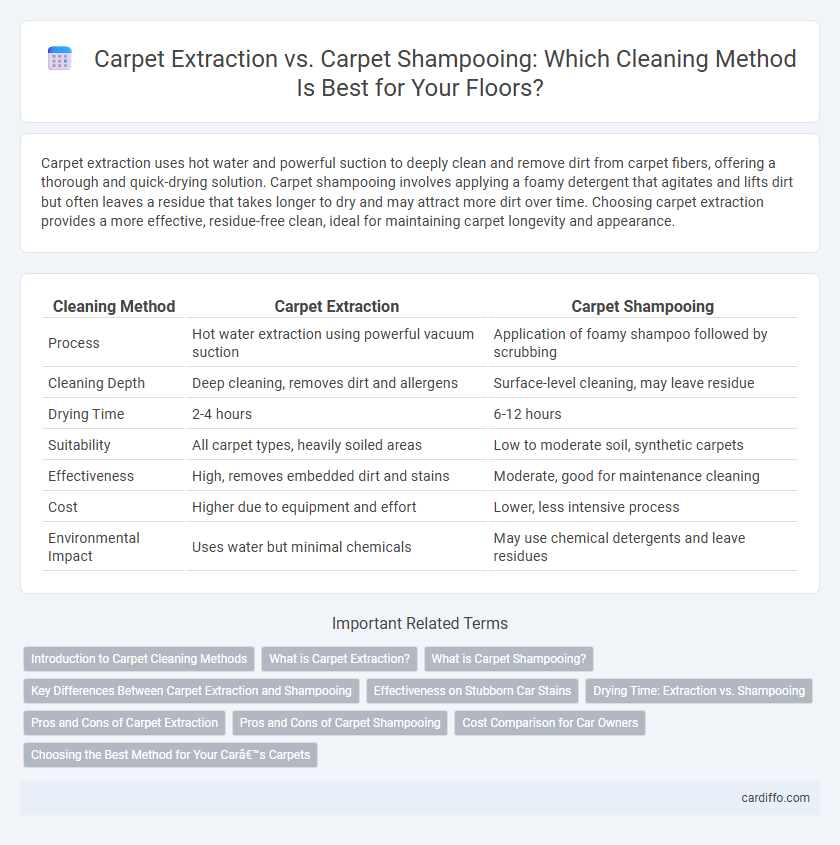Carpet extraction uses hot water and powerful suction to deeply clean and remove dirt from carpet fibers, offering a thorough and quick-drying solution. Carpet shampooing involves applying a foamy detergent that agitates and lifts dirt but often leaves a residue that takes longer to dry and may attract more dirt over time. Choosing carpet extraction provides a more effective, residue-free clean, ideal for maintaining carpet longevity and appearance.
Table of Comparison
| Cleaning Method | Carpet Extraction | Carpet Shampooing |
|---|---|---|
| Process | Hot water extraction using powerful vacuum suction | Application of foamy shampoo followed by scrubbing |
| Cleaning Depth | Deep cleaning, removes dirt and allergens | Surface-level cleaning, may leave residue |
| Drying Time | 2-4 hours | 6-12 hours |
| Suitability | All carpet types, heavily soiled areas | Low to moderate soil, synthetic carpets |
| Effectiveness | High, removes embedded dirt and stains | Moderate, good for maintenance cleaning |
| Cost | Higher due to equipment and effort | Lower, less intensive process |
| Environmental Impact | Uses water but minimal chemicals | May use chemical detergents and leave residues |
Introduction to Carpet Cleaning Methods
Carpet extraction uses hot water and powerful suction to remove deep-seated dirt and allergens, delivering a thorough, professional-grade clean. Carpet shampooing involves applying a foamy detergent that lifts surface dirt, followed by vacuuming once dry, ideal for regular maintenance and lighter soils. Understanding these methods helps optimize carpet longevity and indoor air quality through appropriate cleaning choices.
What is Carpet Extraction?
Carpet extraction, also known as hot water extraction, is a deep-cleaning method that injects hot water and cleaning solution into carpet fibers before vacuuming out dirt, debris, and allergens. This technique penetrates deeply to remove embedded contaminants, making it more effective for thorough carpet maintenance compared to surface cleaning methods. Carpet extraction is widely recommended for its ability to restore carpet appearance and enhance indoor air quality.
What is Carpet Shampooing?
Carpet shampooing is a deep-cleaning method that involves applying a foamy detergent to the carpet fibers and agitating it to remove dirt and stains. This process uses a rotary brush machine to work the shampoo into the carpet, loosening dirt trapped deep within the fibers. Unlike carpet extraction, shampooing leaves a residue that can attract dirt if not properly rinsed, making it more suitable for heavily soiled carpets that require intensive cleaning.
Key Differences Between Carpet Extraction and Shampooing
Carpet extraction employs hot water and powerful suction to remove dirt, allergens, and residues deeply embedded in carpet fibers, while carpet shampooing uses foamy detergents to loosen surface dirt and stains. Extraction is highly effective for deep cleaning and quick drying, making it ideal for heavily soiled carpets, whereas shampooing may leave behind residues and requires longer drying times. The key difference lies in the cleaning mechanism and effectiveness, with extraction providing a more thorough, residue-free result compared to the surface-level cleansing of shampooing.
Effectiveness on Stubborn Car Stains
Carpet extraction uses hot water and high-pressure suction to effectively remove deep-seated dirt and stubborn car stains, providing a thorough clean compared to carpet shampooing. Carpet shampooing covers the surface with foam that loosens dirt, but it may leave residue that re-attracts stains and requires longer drying times. For persistent automotive stains like grease and tar, carpet extraction offers superior stain removal and faster restoration of carpet appearance.
Drying Time: Extraction vs. Shampooing
Carpet extraction uses hot water and powerful suction to remove dirt, resulting in a drying time of 4 to 6 hours, whereas carpet shampooing involves applying foam detergent that typically requires 12 to 24 hours to dry. The quicker drying time of extraction reduces the risk of mold and mildew growth, promoting a healthier indoor environment. Choosing carpet extraction over shampooing enhances convenience by minimizing downtime in high-traffic areas.
Pros and Cons of Carpet Extraction
Carpet extraction uses hot water and powerful suction to remove deep-seated dirt and allergens, providing a thorough clean that extends carpet life and improves indoor air quality. However, it requires longer drying times, which can temporarily limit carpet use and may lead to mold growth if not properly dried. Its effectiveness on heavily soiled carpets outweighs the potential inconvenience of moisture retention compared to carpet shampooing, which often leaves residues and dries faster but cleans less deeply.
Pros and Cons of Carpet Shampooing
Carpet shampooing effectively removes dirt and stains by using a foamy detergent that agitates carpet fibers, making it suitable for deep cleaning heavily soiled areas. However, it often requires longer drying times and can leave behind residue that attracts dirt, potentially causing carpets to re-soil faster. The method is generally less effective for preventing mold or mildew growth compared to hot water extraction techniques.
Cost Comparison for Car Owners
Carpet extraction typically costs between $30 and $70 per room, offering a deep clean by removing embedded dirt with hot water and powerful suction, making it a cost-efficient choice for car owners seeking thorough results. Carpet shampooing averages around $25 to $50 per room but may require longer drying times and potentially more frequent cleanings, which can increase overall expenses for vehicle interiors. Investing in carpet extraction provides better long-term value by reducing allergens and maintaining carpet appearance, essential for preserving car resale value.
Choosing the Best Method for Your Car’s Carpets
Carpet extraction uses hot water and powerful suction to remove deep-seated dirt and allergens from your car's carpets, making it ideal for thorough cleaning and quick drying. Carpet shampooing involves applying a foamy detergent and scrubbing to lift surface stains and dirt, which may require longer drying times and is better suited for lighter soil levels. Choosing the best method depends on your carpet's material, level of soiling, and drying time preferences to maintain a fresh and clean interior.
Carpet extraction vs Carpet shampooing Infographic

 cardiffo.com
cardiffo.com